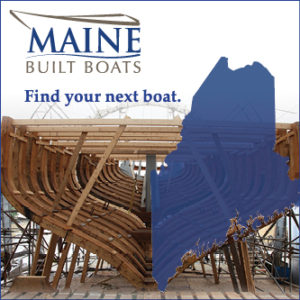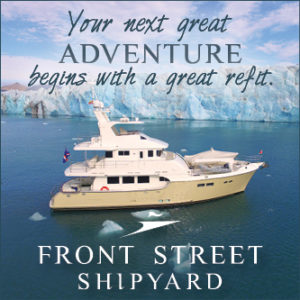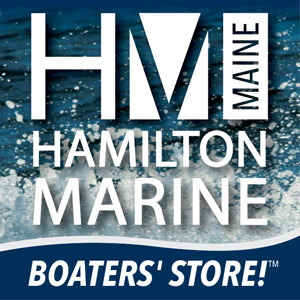Part IV – Final
Over the last three issues we have published articles derived from an interview with Casco Bay fisherman Willis Spear. Willis has had a very interesting time on the water and he wanted to preserve the memories of those that helped give him his start. In this article Willis tells about his other career as an engineer.
Willis went to South Maine Vocational School taking their Marine Science program where he earned a degree as an engineer. “They had a little ship,” added Willis. “That was 180 feet long and had two engine rooms. That was the school ship. They called it the ELI. It was a patrol craft escort, and a great training ship. My instructor was Bob Soucy, he was class of like ’56, and there was Charlie Hall. Charlie came from the Isle of Shoals. He and his brothers were born on the Isle of Shoals and later moved to Kittery Point. Charlie taught navigation and he could teach. Louie LaMorelo was the mate on the ship and he graduated with Soucy. Louie went back to sea, sailed for APL and Sea Land and retired eventually. There was a guy from the Coast Guard, Richard Arlander that taught and there was George Hupper, who he taught navigation. Arlander taught engine and then the other engineer on the ship was Aston Doughty, who sailed with my father-in-law, was a fisherman. Nat Turner who was with Bushy Brothers and Boston Fuel. You got a good education from those guys. I got out of school and I got a job with an environmental company running a research boat on the Hudson River in New York. We just collected the data and maintained the boats. I had been there a year and my future wife came down. She was a biologist who went to SMVTI. I used to see her, I never know who she was but I worked on the Casco Bay Lines and I would see her on the boat. I thought she was an interesting person, quite pretty and I remember trying to impress her one time when we pulled into Long Island. She would always stand alone, never stood with anybody, and she was standing by a piling so I made this beautiful shot, April you know, nice day, dropped that line right over that piling right in front of her and wrong pylon. Okay. So, we get up a little closer and I went to flip it off and I leaned over the side of that ferry boat and I keep going and I was perfectly vertical with my fingers dug into the chicken wire they have all the way around the main deck to keep kids from falling overboard. Thank God there was a guy behind me as he grabbed me by the rear end of the pants. I made an impression on her, wasn’t exactly a good one. She had showed up in New York and then I found out her brother was Skip Werner, who lobstered and her father who had been a fisherman, so we had something in common and we started dating in New York in December ’73. I was with her for part of ’74 and they shipped me out to the Great Lakes to work collecting data for Detroit Edison on the St. Clair River between Lake Huron and Lake Erie. Then they shipped me over to Gary, Indiana and we did work for northern Indiana, power companies, but I missed the ocean. This company we worked for was Texas Instruments Environmental Services, there parent company was Geo-Physical Services out of Houston, Texas a seismic company. They needed a company to make their electronics for seismic, which became Texas Instruments and then Texas Instruments invented the Silicon transistor. They outgrew the parent company so this seismic company was an interesting venture. In the fall, September ’74, I had two week’s vacation so I worked on a lobster smack, which worked for Donald Barnes at Union Wharf.
“I went to sea on the J. E. JOHNSON out of Halifax, Nova Scotia,” continued Willis, We worked off Sable Island and then we went up to the Grand Bank and worked what they call Whale Deep and Green Bank and then the tail of the Banks. It must have been 21 day trips. The ship was 180 feet long, an ex-tuna seiner. We would look for oil, mostly in the Flemish Gap and as the season progressed it got rougher and rougher. They gave it up on December 8th, and the boat went down and did a job off the North Umberland Straits between Prince Edward Island and Cape Breton, Nova Scotia. They flew me to a garden spot called Farenkea, Columbia and that was quite an experience. Columbia, was a tough place. Ferinkea was in the Rio Magdalena River and that was one of the strongest running rivers in the world. I mean whole islands of mangroves would be coming down the river. They had to anchor in the river, you couldn’t tie up at the dock because we would get everything stolen. Even anchored in the river it got stolen. We worked off of a place called Carpola Vela, which was between Columbia and Venezuela and it was rough. Went to Trinidad, then Brazil and I got off in June, and came home.”
With Willis it is all about the people. He explained, “These guys were some of the first oil explorers in Saudi Arabia. First ones into Venezuela, first ones in the Arctic. I worked with some really good, very dedicated people that had been around forever and they told me stories. They used to us dynamite and gas on land. Crews would dig holes put sticks of dynamite in them and light them off.
The ships would tow a tube array of air guns and there was a computer on the boat that told this thing it was time to fire. We had 32 of these things behind the ship. Then we had a reel with a cable and a Styrofoam buoy at the end, three miles astern. That cable picked up the echoes from the explosions and be recorded. My job was I took care of those air guns and the compressors. The seismologists could then tell you what you were looking at. You would walk into the instrument room and there would be a big paper chart, like you see on the old sound machines, showing the bottom. The echoes would be between 30 and 60,000 feet into the earth. Today, this stuff is all ancient history. I can’t imagine what it is like now. We got into 3-dimensional work. It was the first time they were not just looking down, they were looking sideways. They would look for salt domes below the earth’s crust where pressures from inside the earth would start to push up on the surface of the earth. In the ocean there are layers of salt deposits. These domes looked just like a bell. I did see one off the Mississippi River.”
In 1975 Willis went down to Uruguay and worked out of Rio De La Plata, but he had had enough he wanted to come home and go fishing. He was supposed to go back and work on a hard water crew up in the Arctic in the fall of 1976, but he was not interested in returning. He added, “They called me up and I told them I wasn’t going, so they said okay, you are all done. I spent almost five years with them and then I went fishing till 2007. That is when the price of shrimp tanked and I got a job in New York working on tugs for a while in the winter. I got them lobsters, told them jokes and they kept me around. It was a good job. I worked for McAllister and they were good to me. They let me come home in the spring and go back in the fall. Two years I was an AB on a barge, the last single skin black oil barge on the East Coast, and you would be on there for 30 days. Then I got the engineer’s license and they put me on a little harbor tug. Loved it. We just worked the harbor, but once in a while we would go up river where they had some boatyards.”
Willis enjoyed Fleet Day in New York, where they moved naval vessels around. “The New York PD would come over,” said Willis, “with their divers and they would go down and make sure that nobody had put anything on the bottom of your boat. Those divers were great. I would take them into the engine room. I said to one of them, ‘you guys must have a terrible job down there. There must be bodies all over the place,’ and they go, ‘no, no, we will find buckets of cements with people’s footprints, but no bodies.”
Willis worked with them four years and then his wife told him to stay home and go fishing and he has. He made his living from the water, which he absolutely enjoyed. However it was not just being on the water that was enjoyable, but the people he met along the way. He added, “They were the best. They helped me all the way through this odd career. I have been very lucky and the people I have met along the way, the information is there if you want to listen. Now I am just going to keep going as long as I can.”



